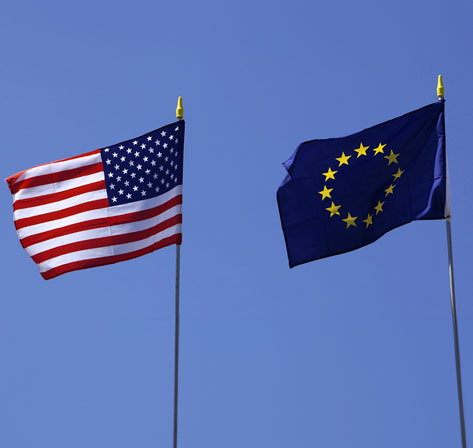June 2023
U.S. Perspective on European Union Enlargement
Region: Transatlantic Perspectives: Americas
Author: Pero Jolevski
A Perspective from Washington on EU Policy in Light of President Macron’s Speech at GLOBSEC
At the recent GLOBSEC Forum, French President Emmanuel Macron gave a remarkable keynote address emphasizing the importance of Central European leadership, particularly concerning the war in Ukraine. President Macron emphasized his support for EU enlargement and voiced that Europe should be united, noting, “I do not believe there is a “Western” Europe and an “Eastern” Europe, an “old” Europe, and a “new” Europe. That would mean perpetuating the artificial border imposed for decades by the Soviet Union. There is only one Europe. A single weave of intertwined histories and diversity, but with the will for geographical and geopolitical unity and to build, ultimately, a common narrative.”
In his address, President Macron discussed key issues that Europe should focus on, from the European Political Community to strengthening Europe’s sovereign capacity in energy, technology, and military capabilities. He noted that EU integration of the Western Balkans, Ukraine and Moldova should not be delayed, and that procrastination of EU enlargement could further destabilize Europe. With Germany’s political leadership currently absent across Europe, Macron has an opportunity to position himself and France as a leader in the European community and push forward the enlargement efforts.
Is the European Political Community enough to unite Europe and President Macron’s pro-EU enlargement?
The last EU enlargement was in 2013, when Croatia joined the European Union. Ten years later, the EU enlargement process has stalled, with different countries blocking the accession process. It is apparent that there is a fatigue of new EU enlargement. First, Greece blocked North Macedonia until 2018. Following the name change, which was done for EU and NATO integration purposes, in 2019 France blocked the start of the EU accession process of both North Macedonia and Albania. Since 2020, Bulgaria has been blocking the EU enlargement process of the Western Balkans.
While there has been little progress on the EU enlargement front, President Macron’s European Political Community initiative, established in 2022, has successfully gathered states from across Europe that share the same values. The initiative is a great forum for European leaders to hold political and strategic discussions about the future of Europe. However, it should not be an alternative to EU membership. Some perceive the European Political Community to delay the EU integration process of new aspiring members such as the Western Balkans, Ukraine, and Moldova.
What should the EU do next?
If the European Union is committed to enlargement, it should begin economic rather than political integration with all aspiring member states. Governments and political leaders change every few years, but the countries and the economies remain the same. The EU should allow access to the European single market as well as EU structural funds for development to countries that have received candidacy status. This should not be seen as an alternative to joining the EU but rather as a step in the EU integration process. Economic integration of aspiring member states would allow those states to be economically prepared to join the EU while simultaneously contributing to each country’s growth and trade. Aspiring members can be integrated into the broader EU market by enabling countries to be part of the European single market. Furthermore, allowing those states access to EU structural funds for development will allow countries to have the necessary infrastructure in place when officially becoming a member.
Conclusion
EU leaders should act on enlargement and economic integration with aspiring member states to avoid unintended consequences. Given the lack of leadership within the EU, President Macron has an opportunity to lead these efforts. With some countries holding candidacy status for almost 20 years and the accession process still not started, support for the EU may deteriorate among the people. The EU should be more proactive in its enlargement and have a clear path for its future members. Leaving states in limbo allows countries like China or Russia to increase their presence economically and politically.
